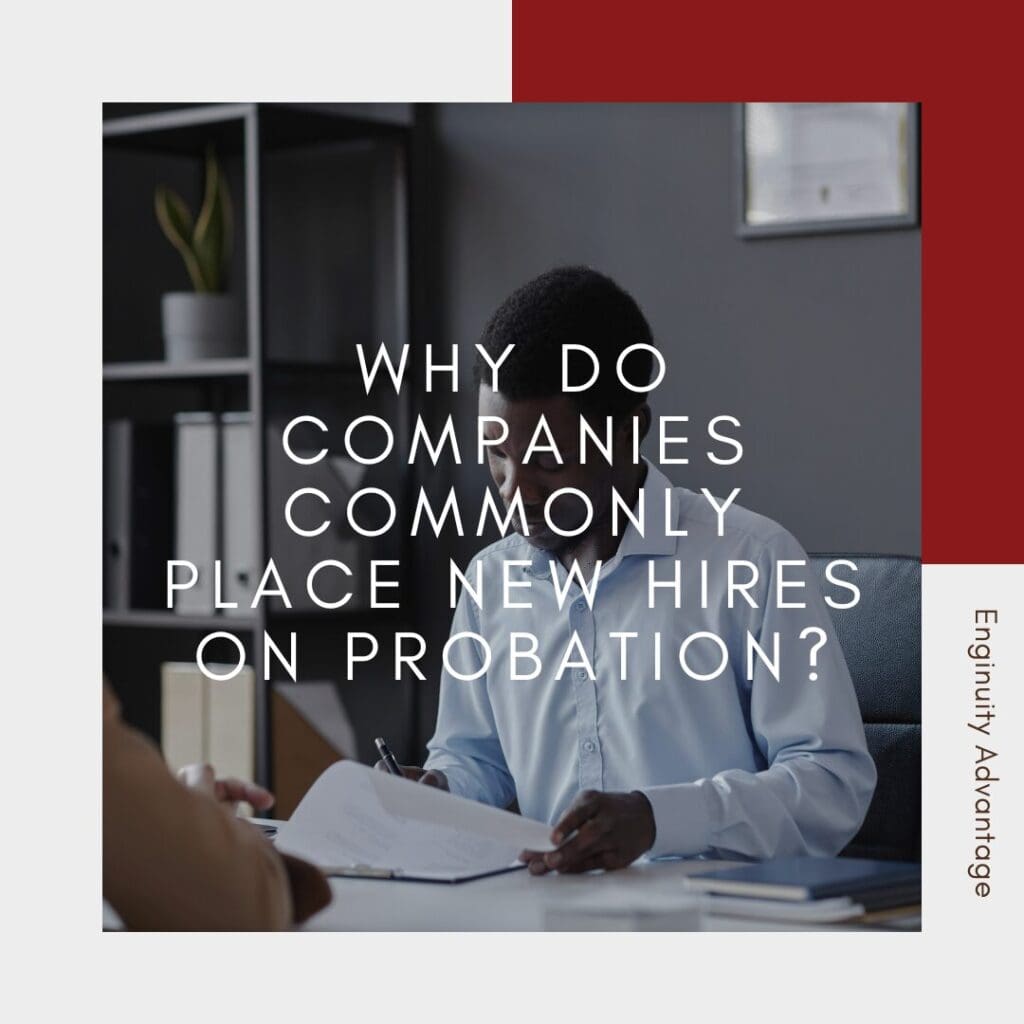Why Do Companies Commonly Place New Hires on Probation?

Probationary periods have long been a cornerstone of the hiring process, serving as a trial run for both employers and new hires. This initial phase, typically lasting 30 to 90 days, allows both parties to assess the fit, set expectations, and build a foundation for a successful working relationship. While often perceived as a period of scrutiny, probationary periods offer valuable opportunities for growth, development, and mutual understanding.
Why Companies Use Probationary Periods
There are several key reasons why companies utilize probationary periods:
- Validating Skills and Performance: Resumes and interviews provide a snapshot of a candidate’s qualifications, but they don’t always translate to real-world performance. Probation allows employers to observe firsthand how a new hire handles their responsibilities, meets deadlines, collaborates with colleagues, and contributes to the team. This is especially crucial for roles requiring specialized skills or technical expertise, where practical demonstrations are essential.
- Assessing Cultural Fit: Beyond technical skills, cultural alignment is vital for long-term success. Every organization has its own unique culture, defined by values, communication styles, and work norms. Probation allows both the employer and the employee to assess this fit. Does the employee thrive in a collaborative environment? Do they demonstrate the company’s values? Is their communication style in sync with the team? A mismatch in cultural fit can lead to dissatisfaction and turnover, making this assessment crucial.
- Mitigating Risk: Hiring is an investment, and probationary periods act as a safeguard. If it becomes apparent that the employee isn’t a good fit, adjustments can be made more easily during this initial phase. This reduces the financial and logistical burden of a mis-hire and can also mitigate potential legal complications. Many companies use probation to clarify employment terms and expectations, minimizing disputes if the relationship ends prematurely.
- Facilitating Growth and Development: Probation isn’t just about evaluation; it’s also about growth. New hires can use this time to acclimate to their role, receive feedback, and make adjustments. Managers typically provide more frequent check-ins and performance reviews during probation, offering guidance and support. This fosters a learning environment where employees can develop their skills and contribute more effectively.
- Encouraging Open Communication: Probationary periods promote transparency and open dialogue. By setting clear goals and expectations from the outset, both parties have a framework for evaluating progress. Regular feedback sessions allow for addressing challenges early on, creating a supportive environment where employees feel heard and employers can make informed decisions. This open communication sets the stage for a productive and trusting working relationship.
Benefits for Employees
While probationary periods are often viewed from the employer’s perspective, they offer significant benefits for employees as well:
- Opportunity to Prove Themselves: Probation is a chance to showcase skills, initiative, and adaptability. By exceeding expectations and demonstrating a willingness to learn, employees can make a strong impression and set the stage for career advancement.
- Receiving Constructive Feedback: Frequent feedback during probation helps employees understand their strengths and areas for improvement. This guidance allows them to refine their approach, develop their skills, and contribute more effectively to the team.
- Evaluating Cultural Fit: Just as employers assess cultural fit, employees can use this time to determine if the company aligns with their values and professional goals. Is the work environment supportive and engaging? Does the company culture resonate with their personal style? Probation provides valuable insights to make informed decisions about their future with the organization.
- Gaining a Sense of Belonging: Successfully completing probation often instills a sense of accomplishment and belonging. This can boost confidence, increase engagement, and foster a stronger commitment to the company.
Best Practices for Probationary Periods
To maximize the effectiveness of probationary periods, both employers and employees should follow these best practices:
For Employers:
- Establish Clear Expectations: Clearly communicate performance expectations, goals, and evaluation criteria from the outset. This provides a framework for both the employee and the manager to assess progress.
- Provide Regular Feedback: Conduct frequent check-ins and performance reviews during the probationary period. Offer constructive feedback, both positive and negative, to guide the employee’s development.
- Offer Support and Mentorship: Ensure new hires have access to the resources and support they need to succeed. Assign a mentor or buddy to help them integrate into the team and navigate the company culture.
- Document Performance: Maintain detailed records of the employee’s performance, attendance, and any disciplinary actions. This documentation is essential for making informed decisions about their future with the company.
For Employees:
- Be Proactive: Take initiative, ask questions, and seek feedback. Demonstrate a willingness to learn and adapt to the company’s culture and expectations.
- Meet Deadlines and Expectations: Consistently meet deadlines, fulfill assigned responsibilities, and demonstrate a strong work ethic.
- Communicate Effectively: Maintain open communication with your manager, address any concerns promptly, and actively participate in feedback sessions.
- Embrace the Learning Curve: Be prepared to learn new skills, adapt to new processes, and embrace challenges. View the probationary period as an opportunity for growth and development.
The Role of HR and Recruitment
Human resources departments and recruitment agencies play a crucial role in developing and implementing effective probationary period policies. They can provide guidance on legal compliance, develop standardized evaluation procedures, and offer training to managers on conducting performance reviews.
For organizations seeking to optimize their hiring process and ensure successful onboarding, partnering with a specialized recruitment agency can be invaluable. Enginuity Advantage, for example, specializes in connecting companies with top talent and providing insights to enhance hiring success.
Conclusion
Probationary periods are a valuable tool for both employers and employees. By providing a structured framework for assessment, feedback, and growth, they contribute to successful onboarding, increased retention, and a more productive workplace. When implemented effectively, probationary periods build a strong foundation for long-term success, benefiting both the individual and the organization.
Unlock Dream Careers & Elite Talent: Just One Click Away!


